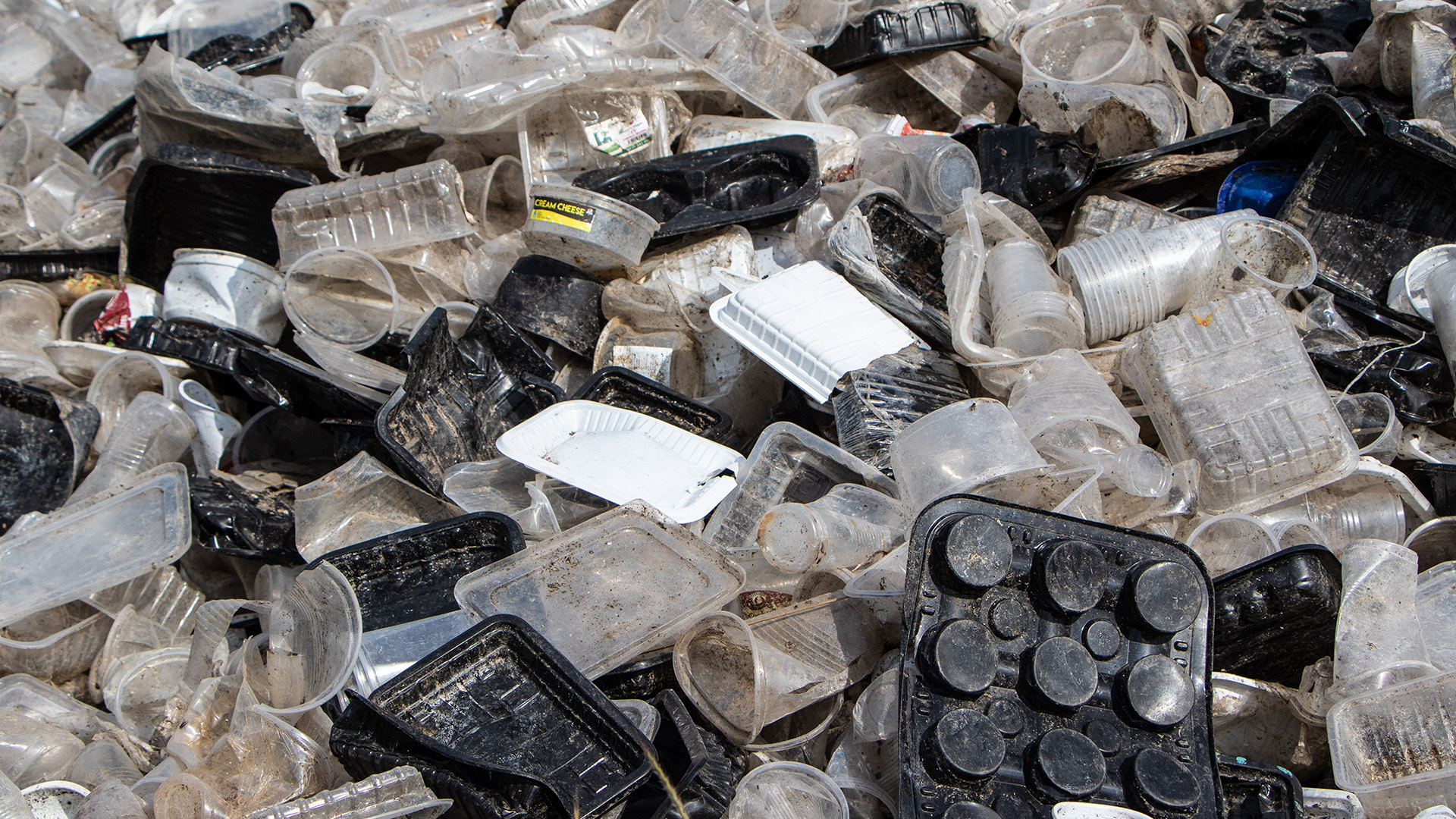
World’s first legally binding treaty to curb plastic pollution fails at UN summit
By Jack Aylmer (Energy Correspondent), Zachary Hill (Video Editor), Ali Caldwell (Motion Graphics Designer)
An attempt to finalize the world’s first legally binding treaty to curb plastic pollution collapsed in its final stage during last month’s United Nations summit in South Korea. Representatives from over 200 nations convened at this forum, aiming to address the environmental and human health impacts posed by plastic waste, but disagreements over production limits derailed the negotiations.
Media Landscape
See how news outlets across the political spectrum are covering this story. Learn moreBias Distribution
Left
Right
Untracked Bias
A coalition of 100 member states advocated for including restrictions on new plastic production as part of the treaty. These calls for such measures come amid a rise in global plastic production, which currently exceeds 460 million metric tons annually –– the equivalent weight of 571 Golden Gate Bridges. Projections suggest this figure could surge 70% by 2040 if no action is taken.

Download the SAN app today to stay up-to-date with Unbiased. Straight Facts™.
Point phone camera here
According to the United Nations, over 8 billion tons of plastic have been produced globally since 1950, but less than 10% has been recycled. Each year, 20 million metric tons of plastic waste –– roughly the weight of 60 Empire State Buildings –– enter the environment.
However, a minority group of oil-producing nations, led by Russia and Saudi Arabia, rejected any treaty that would include plastic production caps, citing the potential for them to suffer disproportionate economic consequences as a result.
Kuwait, one of the members of this opposition, argued that the treaty should focus on eliminating plastic pollution rather than plastic production.
Environmental organizations expressed frustration over the failure to reach an agreement. A Plastic Planet condemned it as an “outrage,” highlighting research linking chemicals in plastics to rising rates of fertility decline, youth cancer cases, Alzheimer’s disease, autism and heart disease.
The World Wildlife Fund (WWF) urged willing nations to move forward without the dissenting countries, warning that delays risk exacerbating environmental harm and diminishing momentum for a comprehensive treaty.
With negotiations stalled in South Korea, the 2024 deadline for adopting a plastic pollution treaty initially set in 2022 by 175 countries will now no longer be realized as planned. Although, despite this setback, participating countries are expected to reconvene for further discussions in 2025.
THE WORLD’S FIRST LEGALLY BINDING TREATY TO CURB PLASTIC POLLUTION COLLAPSED IN THE FINAL STAGE OF DISCUSSIONS.
OVER 200 COUNTRIES MET AT A U.N. SUMMIT IN SOUTH KOREA LATE LAST MONTH TO REDUCE THE ENVIRONMENTAL AND HUMAN HEALTH IMPACTS ASSOCIATED WITH THIS MATERIAL.
100 MEMBER STATES CALLED FOR A TREATY THAT WOULD INCLUDE PLACING LIMITS ON NEW PLASTIC PRODUCTION-
BUT A MINORITY GROUP OF OIL PRODUCING NATIONS, LED BY RUSSIA AND SAUDI ARABIA, PREVENTED AN AGREEMENT FROM BEING REACHED.
EVERY YEAR, THE WORLD PRODUCES OVER 460 MILLION METRIC TONS OF PLASTIC-
WHICH IS THE WEIGHT EQUIVALENT OF AROUND 571 GOLDEN GATE BRIDGES.
IF LEFT UNCHECKED, THAT TOTAL IS PROJECTED TO INCREASE 70 PERCENT BY 20-40.
ALSO HAPPENING ANNUALLY- AN ESTIMATED 20 MILLION METRIC TONS OF PLASTIC WASTE IS ADDED TO OUR ENVIRONMENT WORLDWIDE-
ABOUT AS HEAVY AS 60 EMPIRE STATE BUILDINGS.
ACCORDING TO THE U.N., SINCE 1950, MORE THAN EIGHT BILLION TONS OF PLASTIC HAS BEEN PRODUCED GLOBALLY-
BUT LESS THAN 10 PERCENT HAS BEEN RECYCLED
175 COUNTRIES PLEDGED TO ADDRESS THIS PROBLEM BACK IN 20-22-
AGREEING THEN TO MAKE THE FIRST LEGALLY BINDING TREATY ADDRESSING PLASTIC POLLUTION BY THE END OF 2024.
HOWEVER, AFTER THIS LATEST BREAKDOWN IN NEGOTIATIONS, THAT DEADLINE WILL NOW PASS WITHOUT ANY NEW REGULATIONS IN PLACE.
ULTIMATELY THE DEAL FELL APART OVER THE INCLUSION OF ANY TARGETS TO LIMIT NEW PLASTIC PRODUCTION-
WITH RUSSIA, SAUDI ARABIA, IRAN AND KUWAIT REJECTING THIS PROPOSAL.
DOING SO OVER THE OPINION IT WOULD CONSTITUTE A DISPROPORTIONAL BLOW TO THEIR ECONOMIES COMPARED TO OTHER LESS OIL-DEPENDENT NATIONS.
KUWAIT’S DELEGATE TO THESE U.N. TALKS ADDED THEY BELIEVE THE OBJECTIVE OF THIS TREATY SHOULD BE TO END PLASTIC POLLUTION, NOT PLASTIC ITSELF.
THE ENVIRONMENTAL GROUP ‘A PLASTIC PLANET’ DECRIED THE FAILURE TO REACH A CONSENSUS ON THIS ISSUE AS AN OUTRAGE-
HIGHLIGHTING THE POTENTIAL IMPACTS PLASTIC HAS ON HUMAN HEALTH.
AS THE CHEMICALS IN THIS MATERIALS HAVE BEEN LINKED TO SHARP DECLINES IN FERTILITY, INCREASES IN YOUTH CANCER CASES, ALZHEIMER’S, AUTISM AND HEART DISEASE.
THE WORLD WILDLIFE FUND IS URGING THE COUNTRIES THAT WANTED THIS POLLUTION TREATY TO MOVE FORWARD WITHOUT THE NATIONS THAT OPPOSED IT.
SAYING THEY’RE WORRIED THAT MORE INACTION WILL BRING GREATER ENVIRONMENTAL HARM-
AND FEAR AMBITION TO EVENTUALLY FINALIZE A TREATY WITH ALL MEMBERS WILL FADE AS MORE TIME PASSES.
MEANWHILE, PARTICIPATING COUNTRIES ARE EXPECTED TO RECONVENE AGAIN NEXT YEAR-
WITH THE HOPE OF REACHING AN AGREEMENT IN 20-25.
TO GET MORE STORIES ABOUT HOW VARIOUS FORMS OF POLLUTION ARE IMPACTING OUR PLANET, DOWNLOAD THE STRAIGHT ARROW NEWS APP AND SIGN UP FOR ALERTS FROM ME- JACK AYLMER.
Media Landscape
See how news outlets across the political spectrum are covering this story. Learn moreBias Distribution
Left
Right
Untracked Bias
Straight to your inbox.
By entering your email, you agree to the Terms & Conditions and acknowledge the Privacy Policy.
MOST POPULAR
-
 Reuters
Reuters
It’s a bird, it’s a plane, it’s the first video of Alef Aeronautics’ flying car
Watch 2:1315 hrs ago -
 Getty Images
Getty Images
Democrats in Congress receive lowest approval rating in Quinnipiac poll history
Watch 2:5916 hrs ago -
 Getty Images
Getty Images
AG Bondi reviewing Epstein documents for release, could hold client list
Watch 1:4817 hrs ago -
 AP Images
AP Images
Trump selects Alice Johnson, the woman he previously pardoned, as ‘pardon czar’
Watch 1:5517 hrs ago




